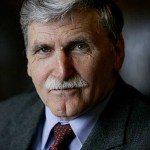Romeo Dallaire | Human Rights Day 2014
 The UN General Assembly proclaimed 10 December as Human Rights Day in 1950. The purpose was to bring to the attention ‘of the peoples of the world’ the Universal Declaration of Human Rights as the common standard of achievement for all peoples and all nations. This year’s slogan, Human Rights 365, encompasses the idea that every day is Human Rights Day. The program is designed to celebrate the fundamental proposition in the Universal Declaration that each one of us, everywhere, at all times is entitled to the full range of human rights, that human rights belong equally to each of us and bind us together as a global community with the same ideals and values. In recognition of the occasion, today’s guest speaker blog comes from International Champion of Human Rights & Award-Winning Author Lt. Gen Roméo Dallaire (Ret), This year Gen. Dallaire stepped away from his role in the Canadian Senate to better focus on The Roméo Dallaire Child Soldiers Initiative, an organization which partners with military, police and peacekeeping forces, equipping them with tools to prevent the recruitment of child soldiers.
The UN General Assembly proclaimed 10 December as Human Rights Day in 1950. The purpose was to bring to the attention ‘of the peoples of the world’ the Universal Declaration of Human Rights as the common standard of achievement for all peoples and all nations. This year’s slogan, Human Rights 365, encompasses the idea that every day is Human Rights Day. The program is designed to celebrate the fundamental proposition in the Universal Declaration that each one of us, everywhere, at all times is entitled to the full range of human rights, that human rights belong equally to each of us and bind us together as a global community with the same ideals and values. In recognition of the occasion, today’s guest speaker blog comes from International Champion of Human Rights & Award-Winning Author Lt. Gen Roméo Dallaire (Ret), This year Gen. Dallaire stepped away from his role in the Canadian Senate to better focus on The Roméo Dallaire Child Soldiers Initiative, an organization which partners with military, police and peacekeeping forces, equipping them with tools to prevent the recruitment of child soldiers. 
How can individuals contribute to the advancement of Human Rights on a daily basis?
The simplest response to the daily commitment to HR is a firm attitude of respect for others versus tolerance, as respect makes us equals and that is the fundamental premise of HR.
This year you stepped away from your role in the Canadian Senate in order to better focus on Humanitarian initiatives, notably, your Roméo Dallaire Child Soldiers Initiative. Can you share how these efforts have helped prevent children from being recruited into conflict?
My commitment to eradicating the use of children and youth as being weapons of war has progressed to a point that we are now involved in a number of conflict countries in Africa. We are also going to Columbia, Jordan and we have received both UN approval and NATO doctrine interest. Being able to spend more time with my Dallaire initiative team at Dalhousie has accelerated our ability to provide the training research and for me personally the advocacy of this mission.
 On April 7th the international community commemorated the 20th anniversary of the Rwandan genocide. What do you view as the greatest humanitarian achievement by the international community in the years since? Or the biggest failure?
On April 7th the international community commemorated the 20th anniversary of the Rwandan genocide. What do you view as the greatest humanitarian achievement by the international community in the years since? Or the biggest failure?
I think the greatest advancement since the Rwandan genocide has been the acceptance of the doctrine of Responsibility to Protect (R2P) in 2005 by the General Assembly of the UN. It is the primary tool to help us prevent mass atrocities and genocide. Secondly the International Criminal Court is growing in its influence on fighting impunity by perpetrators. The greatest failure is the fear by middle powers to commit boots on the ground in a timely fashion and in appropriate numbers to implement the R2P doctrine.
What’s the biggest challenge for 2015 + beyond?
I firmly believe that without determined commitment to proactively engage in preventing mass atrocities in failing states will create an exponential increase in refugees, in internally displaced persons, in the spreading of endemics, and in the recruitment of child soldiers to do the most horrific destruction of innocent civilian population. 